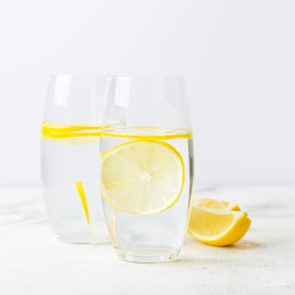Can You Drink Alcohol While Fasting?
Updated: Mar. 16, 2022
When it comes to intermittent fasting and alcohol, whether you should drink or not is a personal choice. Here's how it can affect your fast.
Intermittent fasting and alcohol
It might feel like everyone you talk to is doing intermittent fasting. Recent online searches bear this out: Intermittent fasting was the most-commonly searched diet term of 2019 online, according to Google’s Year in Search trend report.
Intermittent fasting is essentially time-restricted eating. There’s a window of time you can eat and a window when you cannot,” explains Alyssa Pike, RD, a manager for nutrition communications at the International Food Information Council (IFIC) in Washington, D.C.
As for drinking, fasters will usually consume water and other non-calorie beverages, like tea. But what about alcohol? Can drinking alcohol break your fast? Yes and no. During your fasting period, you can’t consume calories, so, therefore, drinking alcohol will break your fast. But, during the eating portion of your fast, you can choose to drink alcohol as part of your caloric intake. (More on this later.)
“Simply put, the different formats of intermittent fasting alter those windows by various lengths of time,” Pike says.

What is intermittent fasting?
Intermittent fasting can take several forms, which you can learn about in our complete guide on how to start intermittent fasting. The most common include:
-
The 16:8 or 14:10 Method: Eat within an eight-hour window and fast for 16 hours. Or eat within a 10-hour window and fast for 14.
-
The 5:2 Method: Eat as you normally would five days per week, and choose two other non-consecutive days of the week to consume 500 to 600 calories.
-
Eat-Stop-Eat Method: Eat as you normally would five days per week, and choose two other non-consecutive days of the week to consume zero calories.
- Alternate day fasting. Switch off between days of eating as you normally would and days of consuming about 500 calories.
-
The Warrior Method: A more complicated method that calls for consuming all of your calories within a four-hour window and fasting for 20 hours.
Can you drink alcohol while intermittent fasting?
Drinking on an empty stomach—fasting or otherwise—is never a good idea, so avoid breaking your fast with an alcoholic beverage.
You are, however, allowed to drink alcohol in moderation on an intermittent fasting plan. Just make sure you do so during your “eating window.” For instance, if you’re following the 16:8 Method and fast from 7 p.m. to 11 a.m. If you choose to have a beer with dinner at 5 p.m. the next day, that’s fine.
But don’t forget that alcohol contains calories; more than most other macronutrients:
-
Carbohydrates: 4 calories per gram
-
Protein: 4 calories per gram
-
Alcohol: 7 calories per gram
-
Fat: 9 calories per gram
Potential health benefits and risks of drinking while intermittent fasting
Keep in mind: You’re trying to limit the production of insulin during intermittent fasting. And alcohol’s impact on insulin—and therefore fasting—is complicated, says Bates. “Some research states ‘conclusively’ that alcohol causes insulin to decrease, which would theoretically be a good thing if weight loss is your goal,” says Bates. “Other (studies) show that alcohol negatively affects the liver and insulin resistance.”
In short, weighing the pros and cons can get confusing. The jury is still out in scientific communities about how alcohol impacts weight loss efforts. When consumed in moderation, it can decrease the risk for several chronic diseases; but it’s also one of the foods that cause inflammation that can cause other diseases.
One thing that isn’t up for debate: Alcohol contains calories and they count when you’re on an intermittent fast. “There is going to be some measure of sugar in nearly all forms of alcohol and therefore will break a fast,” Bates adds.
Beyond that, “alcohol can lower your inhibitions and make fasting more of a challenge,” says Katherine Brooking, RD, co-founder of the nutrition news company Appetite for Health in San Francisco. Alcohol-induced overeating is real, according to a study published in 2017 in Nature Communications.
The National Institutes of Health recommends that women stick to one or fewer drinks per day and men should consume no more than two drinks per day.
Avoid drinking during your fasting window
If you choose to drink alcohol while intermittent fasting, definitely don’t do so before driving. Beyond that, avoid drinking during your fasting window, as it will break your fast, and be sure to eat something and drink plenty of water before drinking alcohol during your eating window.
Aim to drink at least three hours before bed, as imbibing too close to bedtime can impact the body’s ability to enter deep, REM sleep, reports the Sleep Foundation. Stick to three drinks max per week if you’re aiming to lose weight and no more than one each day during your eating window. Dry, lower-alcohol wine and hard spirits (like vodka, gin, or tequila) mixed with sparkling water are among your best bets since they’re lower in sugars and calories than most mixed drinks, sweet wines, and beers. However, you can also try subbing out alcohol for these mocktail recipes.
What nutritionists say about fasting
“Picking a fasting window that works best for your schedule is the key to long-term success,” says Autumn Bates, a certified clinical nutritionist in Manhattan Beach, California. “Many of my clients opt for a 14- or 16-hour fasting window. There aren’t substantially different results between various eating windows, so the important factor is to choose one that fits your lifestyle and schedule.”
That’s because this allows them to share at least one meal a day with friends, family members, or coworkers.
“This act of sharing a meal with others is extremely important for not feeling isolated from those around you. With a time-restricted eating approach where you have a daily ‘fasting window’ of 12 to 20 hours as well as a daily ‘eating window,’ you have the option to schedule your eating times around shared meals with those in your life,” Bates says.
While there are some intermittent fasting benefits, Pike recommends the following groups definitely steer clear:
-
Women who are pregnant or breastfeeding
-
People with diabetes
-
Anyone with a history of an eating disorder
-
Those under age 18
The final word on intermittent fasting and drinking
Alcohol is unlikely to break your fast if you drink it during the eating portion of your fast. However, it’s important to remember that alcohol has calories, and depending on the type of alcohol, they can be excessive. Alcohol can also trigger inflammation and increase your risks for some diseases, but in moderation, consumption can be OK. Remember, if you do drink, stick to dry, lower-alcohol wine and hard spirits and add some sparkling water to limit the intake of sugar and extra calories.
Next, find out whether you can drink lemon water while fasting.





















